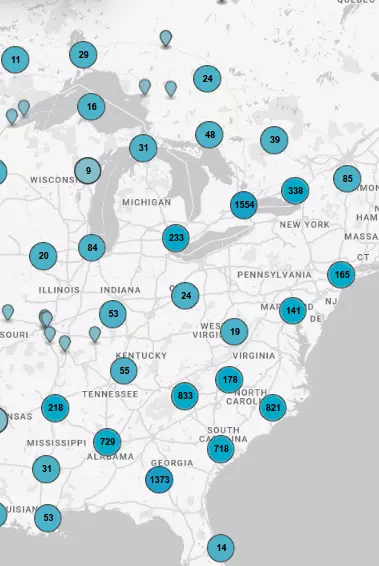Tybee Island
Tybee Island was named by the Indians who came from the interior to hunt and fish. Settled since the beginning of the colony of Georgia, it was the scene in 1775 of the first capture by the...
- lat34
Fort Pulaski
Named for General Casimer Pulaski, the Polish hero who was mortally wounded at the siege of Savannah, 1779, Fort Pulaski was built in accordance with plans by General Simon Bernard, formerly...
- lat34
Federal Batteries on Tybee Island
Between February 21 and April 9, 1862, Federal troops under Gen. Quincy A. Gillmore erected 36 guns in 11 batteries, extending eastwardly on Tybee Island from Lazeretto [sic] Creek opposite Fort...
- lat34
James Moore Wayne, 1790—1867
JAMES MOORE WAYNE, 1790- 1867 FOR 32 YEARS ASSOCIATE JUSTICE OF THE U.S. SUPREME COURT The residence opposite this site, known as the Gordon House, was built between 1819- 1821. A fine example of...
- lat34
Tybee lighthouse
A lighthouse on Tybee was one of the first public structures in Georgia. Completed in 1736 by William Blithman of cedar piles and brickwork, its 90 foot height made it the loftiest in...
- lat34
Fort Screven
The Legislature of Georgia in 1786 passed a law providing for a fort on Cockspur or Tybee Island to be named in honor of General James Screven, Revolutionary War hero, it was never built by...
- lat34
United States Customhouse
Tomo-Chi-Chi, Mico of the Yamacraws, a tribe of the Creek Indian Nation, is buried in this Square. He has been called a co-founder, with Oglethorpe, of The U.S. Customhouse stands on historic...
- lat34
Old Savannah Cotton Exchange
The Savannah Cotton Exchange building was completed in 1887, during the era when Savannah ranked first as a cotton seaport on the Atlantic and second in the world. in its heyday as a cotton port...
- lat34
Capt. Denis N. Cottineau (1745—1808)
This grave links Savannah with one of history´s greatest naval dramas -- the epic fight in 1779 between the ´Bon Homme Richard´ and ´Serapis´ in which John Paul Jones immortalized himself....
- lat34
Chatham Artillery's "Washington Guns"
These cannon, which were captured when Lord Cornwallis surrendered at Yorktown in the American Revolution, were a gift to the Chatham Artillery by President George Washington -- a mark of...
- lat34
Chatham Artillery's "Washington Guns"
These bronze cannon were presented to the Chatham Artillery by President Washington after his visit to Savannah in 1791. Of English and French make, respectively, they are excellent examples of...
- lat34
Evacuation of Savannah
James Edward Oglethorpe, the founder of Georgia, landed with the original colonists, about 114 in number, at the foot of this bluff on February 1 (February 12, new style), 1733. The site where...
- lat34
Capture of the USS "Water Witch"
In May, 1864, the USS ´Water Witch´ (80 officers and men and 4 guns), Lt. Comdr. Austin Pendergrast, USN, was on patrol duty in Ossabaw Sound. On the 31st, Flag Officer Wm. W. Hunter, CSN,...
- lat34
Joseph Clay, patriot
A native of Yorkshire, Joseph Clay (1741-1804) settled at Savannah at the age of nineteen. His uncle, James Habersham, declared that his "Industry" was "highly commendable" and "his Abilities for...
- lat34
Sherman's Headquarters, Green—Meldrim Mansion
General William Tecumseh Sherman used this house as headquarters from Dec. 22, 1864, until Feb. 1, 1865. Charles Green offered the use of his home to General Sherman and his staff. Sherman´s...
- lat34
Major John Berrien (1759—1815)
In 1775 John Berrien of New Jersey came to the province of Georgia, where one of his mother´s kin had previously settled. His father, John Berrien (1711-1772), was a judge of the supreme court...
- lat34
Jasper Spring
On this spot, according to long and persistent tradition, occurred one of Sergeant William Jasper´s most famous exploits during the American Revoution. Here, in 1779, at the spring then located...
- lat34
Sergeant Jasper
Sergeant William Jasper, the famed Revolutionary hero, was mortally wounded a few hundred yards northwest of this spot on October 9, 1779, in the ill-fated attack of the American and French...
- lat34
Birthplace of the University of Georgia
Directly across Bay Street from this marker formerly stood the brick building. Built in late colonial days and known as the "Coffee House." In which the Legislature of Georgia met in 1785. Owned...
- lat34
James Edward Oglethorpe (1696—1785)
The monument in this Square to James Edward Oglethorpe -- the great soldier-philanthropist who founded the colony of Georgia -- was erected by the State of Georgia, the City of Savannah...
- lat34
